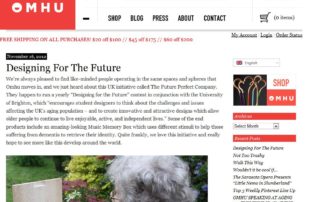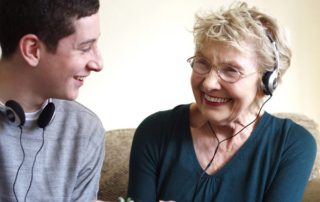THE FUTURE PERFECT COMPANY
The Future Perfect Company supports and promotes creative businesses and has a focus on ageing through its flagship student design project, Designing for the Future.
Founded by former lawyer, Philippa Aldrich in 2009, the company has run the Designing for the Future project for hundreds of UK design students and supported many graduates and start up creative businesses through the DFF Network.
Aging 2.0 – a step forward for age friendly design
Last Thursday, I was invited to talk at the Aging 2.0 event at Google's super cool CampusLondon venue. Aging 2.0 is a global network of innovators working in the 50+ market who are intent on accelerating innovation to improve the quality of life for older adults around the world. This was a pivotal event for me in several ways. First, it took place almost 3 years to the day after I launched The Future Perfect Company, inspired by no small degree by marketing guru Dick Stroud’s influential book, “The 50+Market”. It was rather uncanny to find myself on the same platform
DFF features on Omhu blog
Really delighted that our student design competition, "Designing for the Future", featured last week on the blog of US company, Omhu, designers of very beautiful walking sticks. "November 16, 2012 Designing For The Future We’re always pleased to find like-minded people operating in the same spaces and spheres that Omhu moves in, and we just heard about this UK initiative called The Future Perfect Company. They happen to run a yearly “Designing for the Future” contest in conjunction with the University of Brighton, which “encourages student designers to think about the challenges and issues affecting the UK’s aging population – and to
Quoted in new ILC-UK Report
I was delighted to be quoted in the report on the future of care homes, Care Home, Sweet Home, published today by the think-tank on ageing, the International Longevity Centre-UK. "I think care homes in the future will be less about one physical building but more a network of care and support throughout the community whereby the human element of "care" will be facilitated but not replaced by technology". To read more about the report and how to access a copy , CLICK HERE philippa@www.thefutureperfectcompany.com for more information.
Student design competition steps up a gear as winners are announced
Our student design competition, Designing for the Future, stepped up a gear this year with winners being offered a mentoring package in addition to a cash prize. “Designing for the Future” run by The Future Perfect Company in conjunction with the University of Brighton is now in its third year and encourages student designers to think about the challenges and issues affecting our ageing population – and to create innovative and attractive and designs which allow older people to continue to live enjoyable, active and independent lives. Winner Xenia Moseley, (BA (Hons) 3D Design) and runner up Florence Pike
Four ways to build quality and trust in the mobility market
Demographic changes and pressure on public finances are leading to radical changes in the statutory provision of assistive technology and mobility and disability equipment. Simple aids for daily living – such as walking sticks, mobility aids – are now increasingly appearing in a variety of existing and new channels. You only need to look in the small ads of the Sunday newspaper supplements. However, there are challenges to the emerging market. Public awareness of the existence and benefits of simple living aids is low, the take up is limited by stigma and negative associations of old age and disability. And
To what extent do people with dementia have the right to have control over their own lives?
To what extent do people with dementia, even advanced dementia, have the right to have control and choice over their own lives? This is the question raised by an experimental care facility in the Netherlands. In Hogeweg, everyone lives in the moment. As The Times reported on Saturday, the streets and squares of this experimental Dutch community, with its cafes, restaurant and hairdressers, have been carefully designed to reassure, some would say deceive, the 152 residents. Everyone who lives there has severe dementia and few either know or care that their village is a secure nursing home where the supermarket and restaurant are manned






